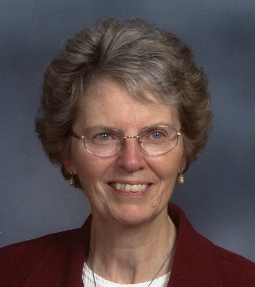Our space gets invaded in many ways. Too many people get on board your bus, an impatient pet licks your face as you sleep, or ants swarm your picnic.
Alone, or with a partner, discuss these questions:
- How do you respond to such invasions? Do you stand your ground or find someplace else to be?
- Do you ever question why inconveniences happen, or just roll with the changes? Explain.
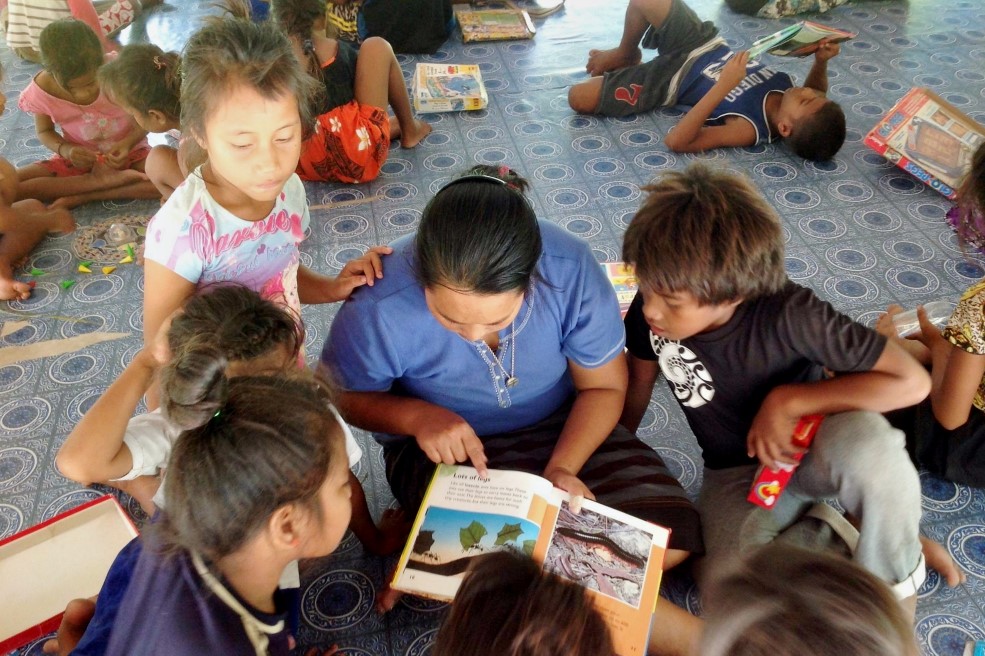
Good Samaritan Sr. Tenta Maritino in a classroom in Kiribati (Provided photo)
We rarely find ourselves in fight-or-flight situations, at least the kind that threaten our way of life, or life itself. At the same time, it's important to recognize how we personally respond to conflict or displacement. Imagine yourself in the predicament faced by the island people in the following story.
Good Samaritans' ministries face challenges of Kiribati's vulnerable future
by Joyce Meyer
"Leave no one behind" is the mantra for the United Nations sustainable development goals for 2030. This past July, attending the U.N. High-Level Political Forum, I heard people from country after country proudly tell stories of how they are implementing these goals. However, pride shifted to defensiveness when representatives from nongovernmental organizations asked how indigenous communities are benefiting. These communities usually struggle with issues such as water quality, gender equity, care for those with disabilities, climate change and human rights. Recognizing those left behind is not always easy. Vision can be clouded by our assumptions.
As I listened, I recognized my own assumptions last year when I visited the South Pacific. I know so little about this part of our world, so I was surprised to learn what a long history the Catholic Church has in the Central Pacific island nation of Kiribati. I was also saddened to learn about the dramatic threat Kiribati faces due to climate change.
Catholicism, the largest faith community in Kiribati, was brought by Sacred Heart Missionary priests from France in 1887. A decade later, the Daughters of Our Lady of the Sacred Heart followed, bravely sailing from France on an old, rundown ship; the shipping company feared losing better ships to the coral reef of the region.
The sisters had few comforts in their new life but remained intrepid amid heat, disease and stark poverty. They opened a school for girls and thrived as young women joined them. They were the lone group of sisters until 1950 when Bishop Octave-Marie Terrienne started a new community of indigenous sisters, the Sisters of St. Therese, that eventually merged with the Daughters in 1968.
Another group of sisters did not arrive in Kiribati until 1991, when Bishop Paul Eusebius Mea Kaiuea invited the Good Samaritan Sisters from Australia to minister there.
I was fortunate to read in a recent Good Samaritan newsletter about two Kiribati women, Kawi Arebonto and Tenta Maritino. They made their first vows in the congregation last year, joining three others. I was excited when they agreed to be interviewed about their experience of religious life in an international congregation and also to learn how they see climate change affecting the future of their island country.
Because of limited internet connections between islands and challenges with English, the sisters asked for help from Brenda Keenan, an Australian lay volunteer. Kiribati comprises three island groups, Phoenix, Line and Gilbert, which consist of 33 islands, all but one of them coral atolls (ring-shaped coral reefs, each with a lagoon in the center and featuring the tip of an undersea volcano). The population of around 110,000 is spread across 21 of the islands.
"Land is the exception rather than the rule in Kiribati," Keenan explains. "Although comprising only 312.9 square miles in land area, its 33 [islands] span 1.35 million square miles of ocean and have an east-west distance approximating New York to Los Angeles (2,404 miles). The highest point above sea level is about 7 to 9 feet. The atolls are extremely flat and low-lying."
She also noted that the sisters' first language is I-Kiribati, a language of only 13 sounds; "ti" is pronounced "s," thus Kiribati is pronounced Kiribas.
I asked the sisters to share their experience of the impact of climate change in their island communities. Both expressed gratitude that their congregation is committed to ecological justice. It is where they learned about the issues of climate change. They now recognize it happening before their very eyes.
They see collapsing sea walls, stronger storms and flooding in some places but decreasing rainfall in others, increasing temperatures, stunted plant growth and even loss of species. As the sea rises and erodes the beautiful beaches, they hear of family wells becoming contaminated by seawater.
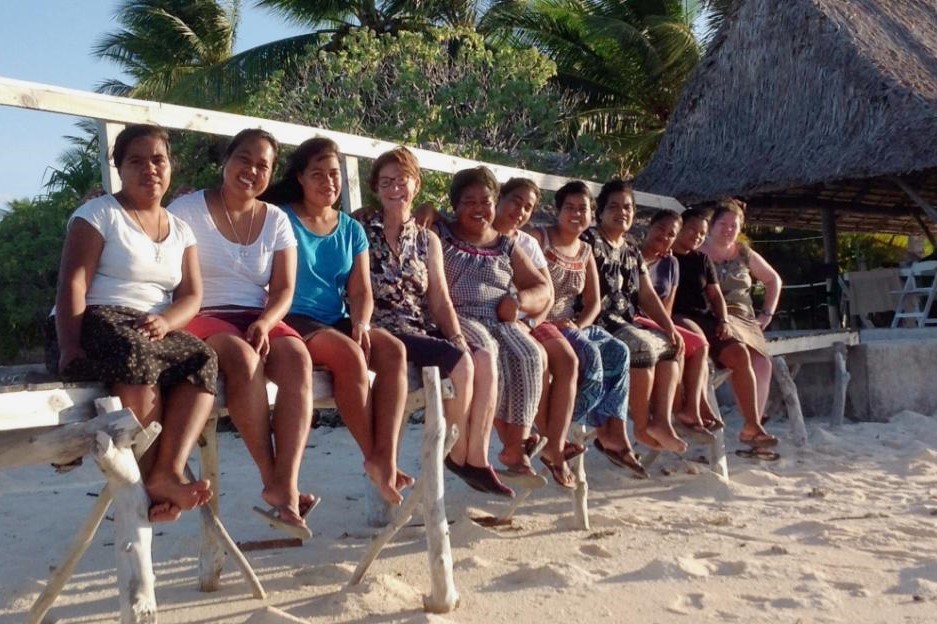
Young Good Samaritan Sisters in Kiribati (Provided photo)
Sister Tenta reported that one family has moved five times since 1987 as the sea encroached upon its land. They fear that soon they will have no place to go and are eager to help build seawalls and plant mangroves to keep the sea contained. I cannot imagine what it must feel like to know that my country is disappearing.
This family is one of the few who are keenly aware of the changes taking place — too many of their neighbors still claim climate change is imaginary, frequently making jokes about it. But they are grateful to the government for purchasing land in the Fiji islands, just in case it is true!
The sisters are also concerned about the extensive use of plastics on the islands and ignorance about the importance of recycling and repurposing. Much education is needed to help islanders realize the consequences of their choices. These two participate in education as much as possible.
Island life on atolls sounded idyllic to me, but I learned this is far from reality. The people are vulnerable in many ways beyond the impact of climate change. Colonialism is still present as China makes inroads and international companies take resources, leaving behind little benefit.
Daily life is simple but not always convenient. Canoe, boat, ship or plane are the primary modes of transportation, and given the sea mass, it can take many hours to get from place to place. On land, walking is most common but some use small cars, trucks, motorbikes and bicycles.
How do people make a living in this kind of environment? A limited few are hired as government workers, teachers, retail and restaurant owners, and sailors. The majority engages in cottage industries, subsistence fishing, small farming, and collecting and selling copra (coconut flesh processed for oil). Life is generally lived in villages and focused on family.
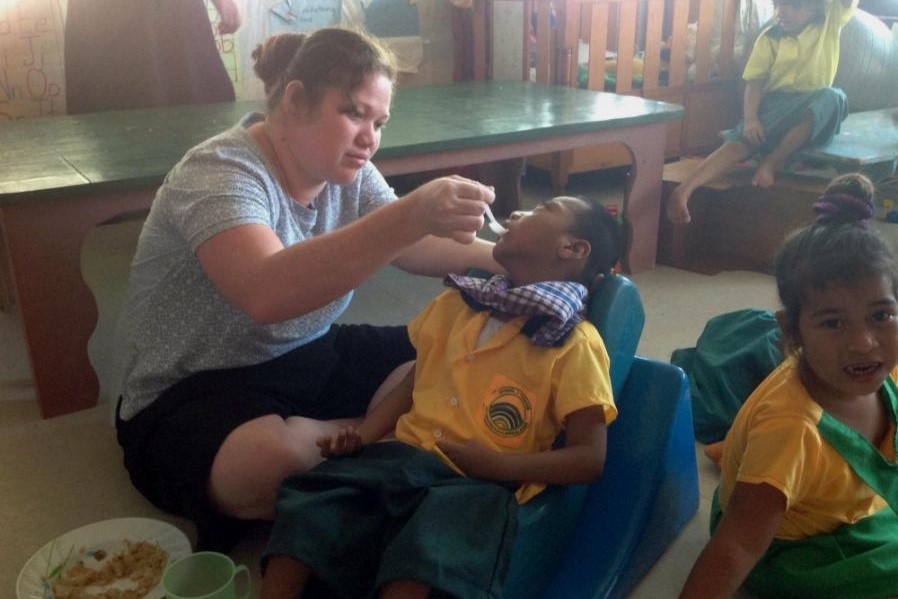
Good Samaritan Sr. Kawi Arebonto works at a school for children with disabilities in Kiribati. (Provided photo)
Sister Kawi was born in Nonouti, an outer island about 12 hours by boat to South Tarawa, capital of Kiribati, where she and her family lived while she completed secondary school. Nonouti is very hot, as it sits just south of the equator, and has a population of about 2,600.
Families throughout the atolls tend to have five or more children and Kawi's family followed this tradition. Her father, who died in 2013, was a teacher. Her mother supplemented his salary as a dressmaker, supporting four girls and five boys. Three of her siblings are some of the few who have paid employment, and the others are farmers and fishers, enjoying a diet of fish, pork, breadfruit, coconut and toddy (coconut sap).
Sister Tenta grew up in the town of Bikenibeu on Tarawa, the most-populated atoll of Kiribati. She lived with her parents, three brothers, three sisters and extended family. Her parents have died, but her father was a carpenter and her mother took care of the home.
Both Kawi and Tenta exuded love of island history and the culture of strong family ties, song, dance, hospitality and generosity.
Both women enthusiastically noted that the witness of the sisters' prayer life inspired them to enter religious life. They added that ministries of pastoral work, care of elders and care of children in schools, kindergartens and centers for children with physical and mental disabilities inspired them to serve others.
Kawi said that the desire to be a sister was with her for many years. She was 24 years old before deciding to join while attending a diocesan pastoral institute that focused on theology and Scripture. Tenta attended the same institute and was attracted to the joy sisters displayed in living in community.
Attraction is important, but adjustment to a different way of life is challenging. I was curious about how their families accepted their choice and also what adjustments the women had to make as they left such close-knit family settings. Both sisters said that their families were happy with their choice of religious life.
Adjustments were challenging. Intercultural living in community was challenging because of the great diversity of backgrounds and cultures ranging from I-Matang (Australians) to the women from different islands. "We have different likes and dislikes and different points of view," Sister Kawi says. Learning English is another challenge.
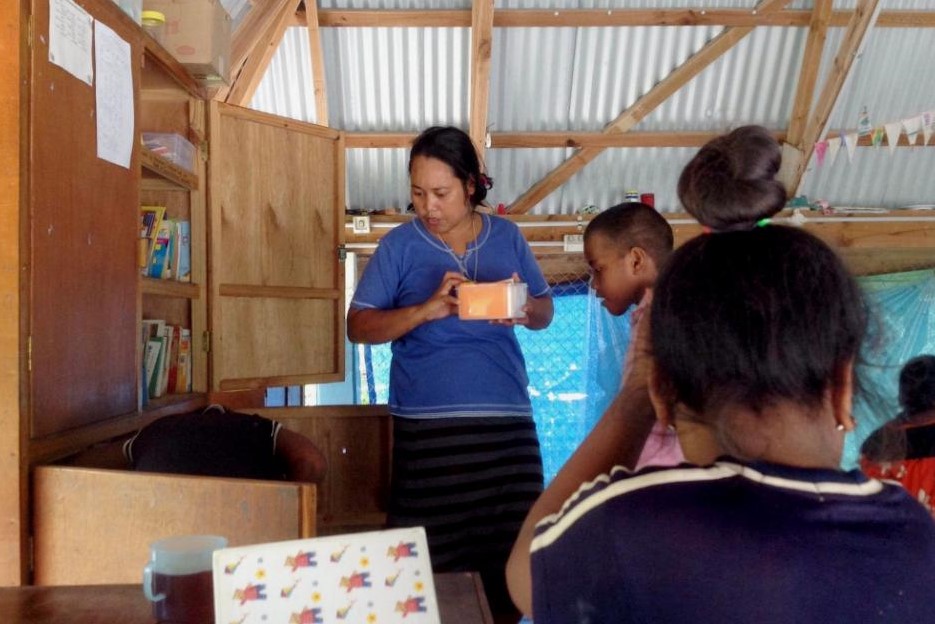
Good Samaritan Sr. Tenta Maritino at the primary school where she teaches (Provided photo)
Kawi admitted that, in the beginning, her greatest challenge was the discipline of time. "In community, we live by time. Time for prayer, time to eat, time to sleep, time to work, time to study, time for leisure, time for reflection, time for anything and for everything. At home, we own our time, and in religious community, time owns us — driven by time."
Although still getting used to the disciplines, she shared her joy in the deepening faith and knowledge of God and herself, too.
For Tenta, the challenge was prayer, particularly learning how to pray the Office and lectio divina. She loves both now and especially the spirituality of St. Benedict, ora et labora (prayer and work). Learning about the charism of the congregation and learning all the spiritual exercises, including meditation and mantras, "provide me great joy."
The two spent two years in the novitiate in New South Wales, Australia, and returned earlier this year to begin new lives of ministry and join one of the two Good Samaritan communities. Tenta now works in the preschool, where she teaches and loves 5-year-olds. "They bring me lots of joy and happiness," but, she says, "It takes a lot of patience as each child has a special personality."
She is also excited about her future and university studies in early-years education. But her most important dream is to be a "faithful Good Samaritan living the spirituality and charism, and becoming a good preacher of the good news."
Although she said that she enjoys travel, she does not expect to be sent on mission outside the country and is happy to stay in "mission to my own people."
Kawi works with children with disabilities at the Early Childhood Center, where she worked before entering religious life. She loves feeding, cleaning and caring for the children. Her dream is to become a qualified teacher of children with disabilities, even though she knows the work can be very hard. She also wants to study English and Scripture and inspire other Kiribati women to join her and the sisters.
I have great admiration for people who live in hope and trust in such vulnerable environments. It is unimaginable for me. These women will face many challenges, but clearly will become important leaders to keep the people united in facing the vulnerabilities of their future as a small nation.
The impact of rising sea levels is frequently in the news, but it's especially alarming in a place where nothing is 9 feet over sea level. If you're shorter than 9 feet tall, answer the following questions:
- If you had miraculous superpowers, what would you do to help the people of Kiribati?
- What are a few realistic efforts they can attempt to remain living on their islands?
- Sr. Kawi and Sr. Tenta are young leaders of their people. What spiritual challenges will they have to respond to as they minister in Kiribati?
The story of Noah's ark is so familiar. People had become wicked, and God got very upset. He flooded the earth, destroying all creatures except a good man named Noah, his family and the creatures on board their big boat. Then God put a rainbow in the sky as a sign of his covenant to never again flood the earth and destroy all its creatures.
The terms of that covenant, or deal, aren't so familiar. God reiterates the responsibility that humans have over all creation. God also emphasizes that humans are made in his image and have a responsibility to respect and protect one another.
"[F]rom a human being, each one for the blood of another, I will demand an accounting for human life."
- How can our harmful acts, though they may seem personal and private, hurt others?
- If you were to make a covenant to prevent water from displacing the people of Kiribati, what would you be willing to commit to?
The plight of people living in low-lying coastal areas captures the attention of Pope Francis in his recent encyclical on the environment. He writes:
"A rise in the sea level, for example, can create extremely serious situations, if we consider that a quarter of the world's population lives on the coast or nearby, and that the majority of our megacities are situated in coastal areas…. There has been a tragic rise in the number of migrants seeking to flee from the growing poverty caused by environmental degradation. They are not recognized by international conventions as refugees; they bear the loss of the lives they have left behind, without enjoying any legal protection whatsoever. Sadly, there is widespread indifference to such suffering, which is even now taking place throughout our world. Our lack of response to these tragedies involving our brothers and sisters points to the loss of that sense of responsibility for our fellow men and women upon which all civil society is founded."
"Laudato Si': On Care for Our Common Home" [24, 25]
- How do you and your closest friends or family respond when one of you is suffering? How would you feel if they were indifferent to your pain?
- Should neighboring countries be expected to provide welcome and refugee to people displaced by rising sea levels? What is our responsibility in these faraway crises?
In addition to meeting the spiritual and physical needs of people in Kiribati, sisters are making people aware of climate change in and beyond the islands. They are spreading the word about its impact. Read this flier in which sisters share stories of rising seas destroying gardens, ravaging hospitals and swamping people. It quotes one person as asking: "Does anybody think about our problem at this time?"
Share a copy of or a link to this flier with your family or friends, then discuss it with them.
Sr. Joyce Meyer begins her article by mentioning the U.N.'s Sustainable Development Goals. This is a global effort made up of 17 goals for the planet and its people, including climate action. Most of the nations in the world have committed to the Paris Agreement, an ambitious plan to curb carbon emissions and limit their impact on the climate. The United States, which is responsible for nearly 18 percent of global greenhouse gas emissions, has decided to withdraw from the agreement.
- Send an e-mail to the president to express your views about this decision.
- Read and consider signing the U.S. Catholic Climate Declaration, which encourages the United States to return to the Paris Agreement.
- Take the St. Francis Pledge, sponsored by the Catholic Climate Covenant, to commit personally to caring for our common home.
Creator God, your work of creation began
when your breath, like a mighty wind, swept across the waters.
May your Spirit, at work in the beginning,
drive our efforts to protect your waters, your land, your creatures and your people.
Breathe in us all the energy, wisdom and courage
to change our ways and respond to this challenge
so that all people might live in safety, dignity and peace.
Amen.
Tell us what you think about this resource, or give us ideas for other resources you'd like to see, by contacting us at education@globalsistersreport.org
